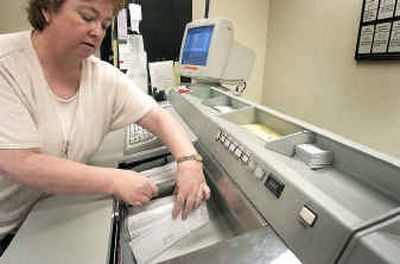Better check twice

Consumers who rely on Friday’s deposit to cover Wednesday’s rent check are losing their grace period.
Beginning Oct. 28, new federal regulations will allow more banks to send checks electronically, reducing “float time” — the lag between when checks are deposited, and when the money is subtracted from the check-writer’s account.
Though most local checks clear the next day, an out-of-town check can take up to five days to clear. With electronic transfers, the float could shrink to 24 hours.
To avoid a slew of overdrafts, banks are cautioning customers not to treat checking accounts like pay-day loan advances.
“You really shouldn’t write checks for money that you don’t have,” chides John Hall, spokesman for the American Banking Association in Washington, D.C. “It’s not a good practice.”
The new law is a legacy of the Sept. 11, 2001, terrorist attacks. During the three days that air traffic was grounded, billions of dollars worth of paper checks en route to check-processing centers were stranded at airports.
“It felt like an eternity,” recalled Joy Rogers, senior operations officer for Mountain West Bank in Coeur d’Alene.
Banks don’t get paid when they can’t clear checks. That put financial institutions across the nation at risk, she said.
Mountain West sends its checks to the Federal Reserve Bank in Portland, where checks deposited before midnight clear by 3 a.m. the next morning. While the airplanes were grounded, couriers drove the checks to Portland.
Sterling Savings Bank of Spokane also hired drivers. Usually, Sterling charters a daily flight from the Spokane airport to get its checks to the Federal Reserve’s Seattle branch.
“The Fed did some miraculous things during 9-11 floating the economy,” said Kade Peterson, Sterling Bank’s senior vice president. “They paid banks when they couldn’t clear the checks. The Feds couldn’t get paid because they couldn’t fly their checks out.”
Last year, President Bush signed the Check Clearing Act for the 21st Century to speed the transition to electronic check transfers.
“Given the availability of inexpensive electronic transmission media, this enormous dependence on ground and air transportation makes very little sense,” a 2003 congressional report concluded.
A small percentage of banks already have individual agreements to transfer checks electronically. But with more than 15,000 banks and credits unions nationwide, broader regulations were needed, said Hall, the American Banking Association’s spokesman.
The new law, known as Check 21 for short, also accommodates banks that aren’t set up for electronic check transfers, Hall said.
Suppose a Spokane businesswoman buys a new dress during a trip to Minneapolis, he said. She pays with a check from a Spokane bank. Though her bank isn’t set up for electronic check clearance, the national bank where the check was deposited is. The national bank sends the check digitally to its Spokane branch, which prints out a paper version of the check, known as a “substitute check.”
A courier drops the substitute check off at the woman’s bank. The bank deducts the money from her account.
It’s a streamlined process, Hall said, compared to sending the check to the nearest branch of the Federal Reserve Bank, which would then forward the check to the customer’s bank for payment.
Under the new law, substitute checks have the legal status of original checks. Bank customers who get their canceled checks back will soon start seeing substitute checks in their monthly statements.
By some estimates, Check 21 could save the banking industry $2 billion annually in transportation and processing fees. But that figure is probably a bit overblown, Hall said.
“You’ve got to realize that many banks won’t be doing this right away,” he said. Some may wait several years to make the transition.
By the end of 2006, 60 to 70 percent of all checks written in the U.S. could clear electronically, according to banking industry projections. Smaller banks in rural areas have the most to gain, Hall said. They send checks the greatest distance, and often battle inclement weather during the winter months, he said.
Mountain West is among the undecided, Rogers said. The bank is mulling whether or not to participate in a pilot program next year.
Sterling Savings Bank began electronic check transfers in December. About 5 percent of the checks deposited at the bank are cleared electronically. It’s a small, but rapidly growing part of Sterling’s operations, Peterson said.
The loss of float time has benefits as well as drawbacks for customers, he said.
“People who deposit checks will get paid faster, and return items will come back faster,” Peterson said. “If a business gets a bad check, they’ll know sooner.”
Despite the new technology, a sizeable percentage of Sterling’s checks will continue to clear the old-fashioned way – by courier. Every evening, thousands of deposited checks are sent back and forth between local banks in the Inland Northwest.
“The ones down the street are the cheapest to clear,” Peterson said.
And, he added, they’ve always had the shortest float.